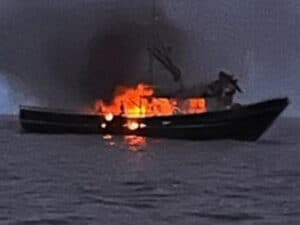
Study identifies 15 key pain points facing women at sea
Written by Nick Blenkey
A study based on interviews with 115 female seafarers identifies 15 key “pain points” – or challenges – facing women at sea. The study is the first step in a project being carried out by the All Aboard Alliance, an initiative launched last year to pave the way for a diverse, equitable, and inclusive maritime industry.
The majority of the 115 interviewees (59%) were women with the rank of one stripe (3rd officer, 4th engineer, junior officer, cadet), followed by 22 women in positions with no stripes (rating, Able-Bodied Seafarers etc). 17 of the women interviewed were officers with two stripes (2nd officer, 3rd engineer). Eight were ranked with three stripes (chief officer, 2nd engineer), and four women with rank of four stripes (captain, chief engineer, doctor). Three women held positions that could not be ranked according to the usual system of stripes (i.e., stewardess).
The interviewed seafarers are of 23 different nationalities. The majority of them, 63%, come from Asia (mainly the Philippines and India), while a quarter is European, including two from Turkey, 9% are from Africa, and 3% are from the Americas.
The 15 key pain points identified fall into four different categories, the first being the difficulty of succeeding professionally at sea for women (i.e., being perceived as less competent than male coworkers, not having equal access to training or tasks onboard, and having to outperform male peers to get respected or promoted).
Another category identified involves how social relations onboard can be especially challenging for women at sea (i.e., feeling isolated or unsupported because of their gender, the concern of gossip or rumors, or power abuse or sexual harassment and sexual misconduct onboard).
The third category relates to systemic employment challenges at sea (i.e., service contracts at sea being too long, lack of family planning options such as maternity leave or sea-shore rotation programs, resulting in many women having to choose between a career at sea or starting a family, in turn pushing women seafarers to find employment elsewhere, and finally, many companies still not being willing to recruit female seafarers).
The final category relates to the physical conditions onboard (i.e., lack of access to female sanitary products onboard or lack of access to adequately fitted personal protective equipment (PPE) such as coveralls, fire gloves etc., or lack of access to designated women’s changing rooms, bathrooms, etc. onboard).
FINDING MEASURES AND SOLUTIONS
With these 15 key pain points now identified in the first data-gathering step of the discovery phase, the All Aboard Alliance is embarking on designing measures and solutions to address each of the 15 key pain points.
“The study provides us with the direction we need to develop adequate measures to find solutions to each of these challenges, and none the least, to decide which of the measures to test in the pilot project later this year. The maritime industry needs female seafarers, and it is important that we work collectively to develop and test ways to make work life onboard more inclusive for everyone,” says Susanne Justesen, Ph.D., project director, human sustainability at Global Maritime Forum and author of the report.
The next step of the project is the pilot phase. It will be launched later this year. Selected vessels from All Aboard Alliance members with higher-than-average numbers of women officers and crew members onboard their vessels will test the co-designed measures and solutions in an action-research approach. The goal is to identify which of the proposed solutions will have most impact in addressing the 15 key pain points identified in the study, guiding the All Aboard Alliance in making a career at sea more inclusive and attractive to female seafarers in the future.
The founding partners of the All Aboard Alliance are the Global Maritime Forum, the Diversity Study Group and Swiss Re.
The alliance hopes its report will help spread awareness of the major challenges experienced by women at sea and that many others will join it on its mission to identify adequate and sustainable solutions for each of the 15 critical pain points.
“We need to make life at sea more inclusive to women seafarers. But now that we have a better understanding of what the pain points are, we can work together to address them. We do not want them to leave their careers at sea because we need them – and we need many more,” says Su Yin Anand, head of shipping at South32 and co-chair of the All Aboard Alliance.
- Download the study HERE




